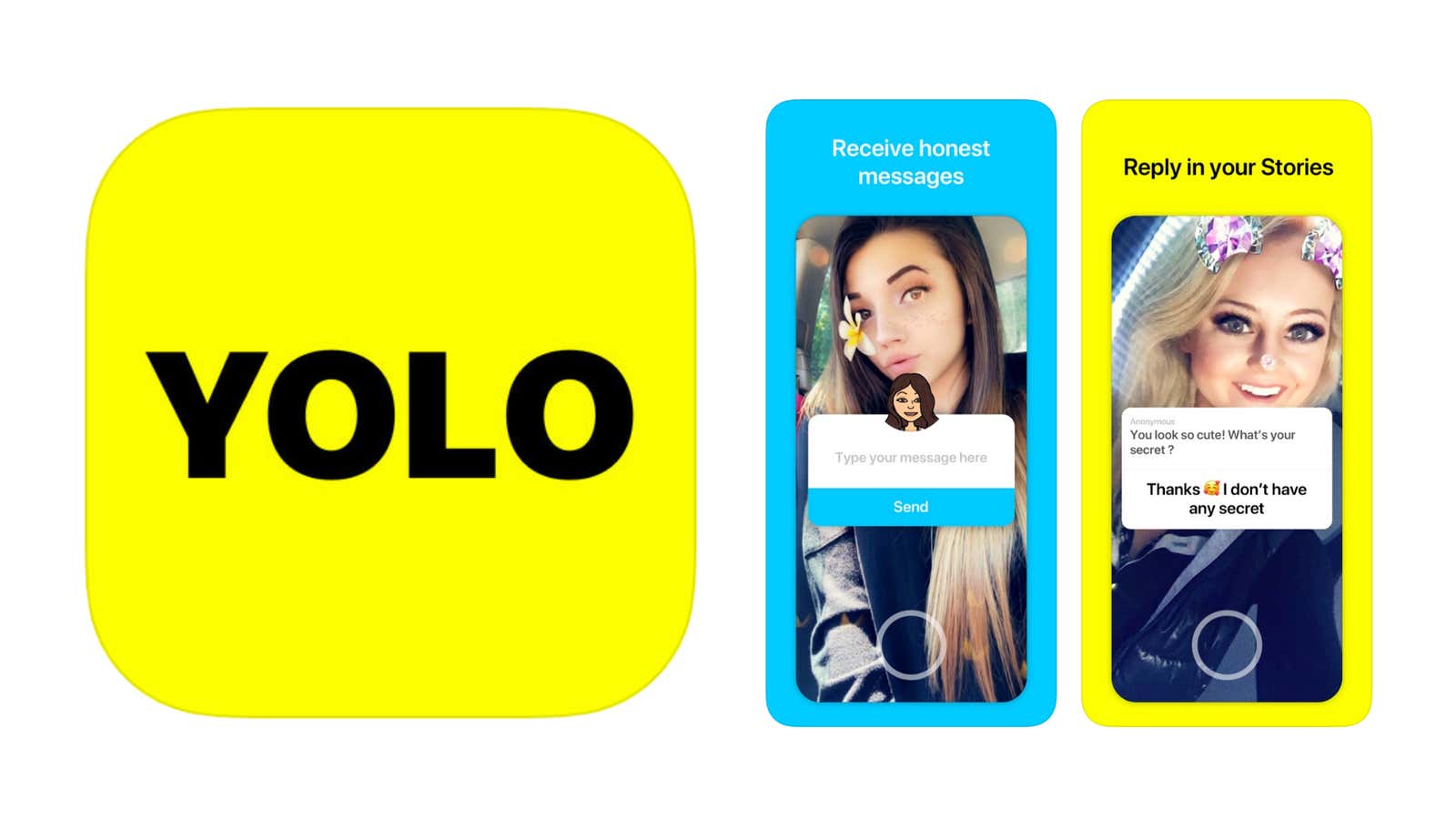What Parents Need to Know About the YOLO Snapchat App

There is a new app called YOLO that is very popular among teenagers. Just a week after its release, it became the most downloaded iPhone app in the US. It’s a free add-on feature for Snapchat – when users connect YOLO to their accounts, they can add a sticker to their Snapchat story that invites their followers to give them feedback or ask them questions anonymously. Then, if they want, users can answer those questions in their stories. Think of it as a block of anonymous comments about your life. “It’s so fun and exciting to see what people say about you,” writes one iTunes columnist.
As you might guess, not all comments are similar to the one in the YOLO screenshot: “You look so cute! What’s your secret? “Some reviewers said the social media app was” filled with bullying “and” caused so much drama. ” There have been reports of security measures designed to protect users from harassment not working and the support team not responding to flagged content.
Parents, if your teen uses this app, here’s what you should know.
Who made YOLO?
The app was created by French startup Popshow, Inc. on the Snap Kit platform for third-party developers. Creator Gregoire Henrion told Techcrunch that YOLO’s growth is completely organic – there was no marketing, and yet it currently ranks above Snapchat itself in iTunes’ free apps chart.
Doesn’t this type of application sound familiar to you?
You might think you’ve seen this before, and that’s because yes, there have been several “honesty” apps that allow teens to anonymously get the peer reviews they crave. Early platforms included Ask.fm, Curious Cat, Yik Yak, Whisper, and Secret. Later we saw Saraha and TBH . High school students love these types of apps and often use them as a source of confirmation – it’s nice to get anonymous comment about how your hair looked great today or that you made a killer speech in class. Henrion tells Techcrunch that his team believes that “anonymity can open up super-good behavior.”
This may be true at some level, but according to Common Sense Media, anonymous apps are also ” notorious centers of cyberbullying .” Almost all of the major ones crashed and burned due to incidents of inappropriate use. Josh Ochs, founder of digital safety resource Safe Smart Social, said these types of apps “can bring out the worst in some teens” and that they tend to be “harmful to human nature.” Burnbook, an app named after Mean Girls’ famous pink tome of school gossip, caused schools to close in Oregon, Texas and California after students reported receiving violent threats.
What worries YOLO the most?
YOLO warns users that if they submit inappropriate or offensive messages, their identities will be revealed, but reviewers who receive such messages claim that this simply does not happen. Instead, if a comment is claimed to be inappropriate, it simply disappears.
People have also raised concerns about privacy – YOLO’s terms of service say the app can “collect and store personally identifiable information,” including your name, phone number, email address, password, photo or avatar, and location, although this is the standard language. The online safety group Protect Young Eyes considers YOLO’s age rating to be too low at 12+, and writes in the survey : “Do you know many 12-year-olds who consistently make good decisions without responsibility for a long time? We, too “.
What if your teen is using the app?
YOLO is similar to the Instagram Questions sticker, which can be both funny and relatively harmless. Your teenager may be able to safely use the app. However, you should pay close attention to any app that fuels the adolescent brain’s cravings for peer approval. Remind your teen that he doesn’t need confirmation from people on the Internet. If you find that they are constantly looking for it, it could be a sign of a more serious problem.
Also, tell them that their words are valid even if they are anonymous, and that it is important to think about any possible consequences before they start typing. Encourage them to talk to you if they are ever bullied, online or outside the home.
When it comes to online safety, every family needs to come up with guidelines that will work for them. If your teens can get involved in creating their own rules, they are much more likely to follow them.